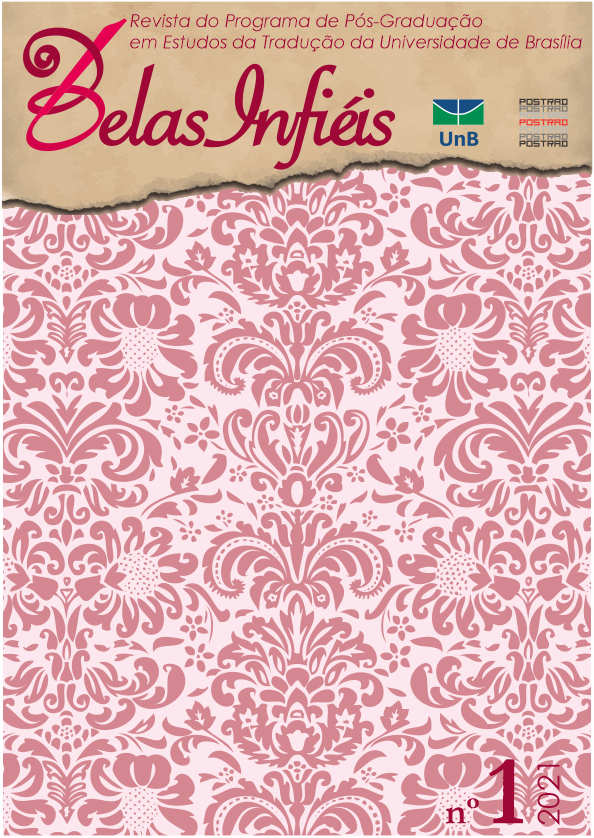Tradução da novela Der Tod des Kleinbürgers, de Franz Werfel, para o português
DOI :
https://doi.org/10.26512/belasinfieis.v10.n1.2021.32614Mots-clés :
Tradução literária, Franz Werfel, A morte do pequeno burguês.Résumé
Franz Werfel nasceu em 1890 em Praga. Sua família pertencia à comunidade judaica da Boêmia alemã. Poeta, contista e romancista, era membro do grupo de Praga, contemporâneo de Franz Kafka. Seu romance mais conhecido é Die vierzig Tage des Musa Dagh. Foi editor de grandes poetas em língua alemã tal como Georg Trakl. Na década de 1920 casa-se com Alma Mahler e vivem em Viena até perceberem como se tornara perigoso ser judeu em territórios sujeitos à Alemanha nazista. Emigram para os Estados Unidos, onde tornou-se cidadão norte-americano em 1941. Morreu em 1945, com 54 anos, de ataque cardíaco. Publicada em 1926, a novela “A morte do pequeno burguês”, está ambientada no período após a Primeira Guerra, época de grande movimento demográfico nas nações que se originam do Império Austro-Húngaro, caracterizada por uma forte imigração da população tcheca de origem germânica para Viena. A rápida modernização urbana não é acompanhada pela geração de empregos necessários para a população. Com o esfacelamento do império austro-húngaro os militares perdem a utilidade e o prestígio. Muitos tiveram de ser demitidos e se tivessem sorte receberiam um posto como funcionários públicos. Segue a tradução do capítulo 01 da novela.
Téléchargements
Références
WERFEL, Franz. (1926) Der Tod des Kleinbürgers. Projekt Gutenberg – DE. https://www.projekt-gutenberg.org/werfel/todklein/titlepage.html
Téléchargements
Publié-e
Comment citer
Numéro
Rubrique
Licence
(c) Tous droits réservés CC BY 2021

Cette œuvre est sous licence Creative Commons Attribution 4.0 International.
Copyright Statement
Given the public access to this journal, the texts are free to use but requires the recognition of the original authorship and initial publication in this journal to be properly stated.
The journal allows the use of works published for non-commercial purposes, including the right to submit the work to publicly accessible databases. Published contributions are the sole and exclusive responsibility of the author(s).
- When submitting papers to be evaluated by the Belas Infiéis journal, the author(s):
- Declare that the contents of the contributions are original and of their original creation, being entirely responsible for their content if there is an objection by third parties.
- Claim to be aware that they should not commit academic plagiarism.
- Declare that the manuscript has not been published, completely or partially, in Portuguese or another language. If it is a translation it should be submitted to the Translated Articles section.
- Declare that the manuscript is not being evaluated by other journals.
- Declare that the manuscript was not submitted to another journal simultaneously.
- Commit(s) to inform the journal of any kind of error or inaccuracy in their contribution (published, in evaluation or in editing) and to collaborate with the editors to make due corrections of the article (when in evaluation or editing) or erratum/retraction (after publication).
- Declare that there is no conflict of interest regarding the published work.
- Authorize its release if it is accepted for publication without any kind of monetary compensation.
- Agree to assign non-exclusive rights to publication to the magazine, remaining free to make their contribution available in other media as long as the publication of the first version in Belas Infiéis magazine is mentioned. They also authorize Belas Infiéis to assign their texts for reproduction in content indexers, virtual libraries and similar platforms.
- Maintain copyright and grant the journal the right of first publication, the work being licensed under theCreative Commons Attribution License.
- Is/Are allowed and encouraged to publish and distribute their work online after the editorial process, which may increase the impact and citation of the published work.
- Authorize the editorial team to make textual adjustments and to adapt the article to the publication rules, when necessary.



















